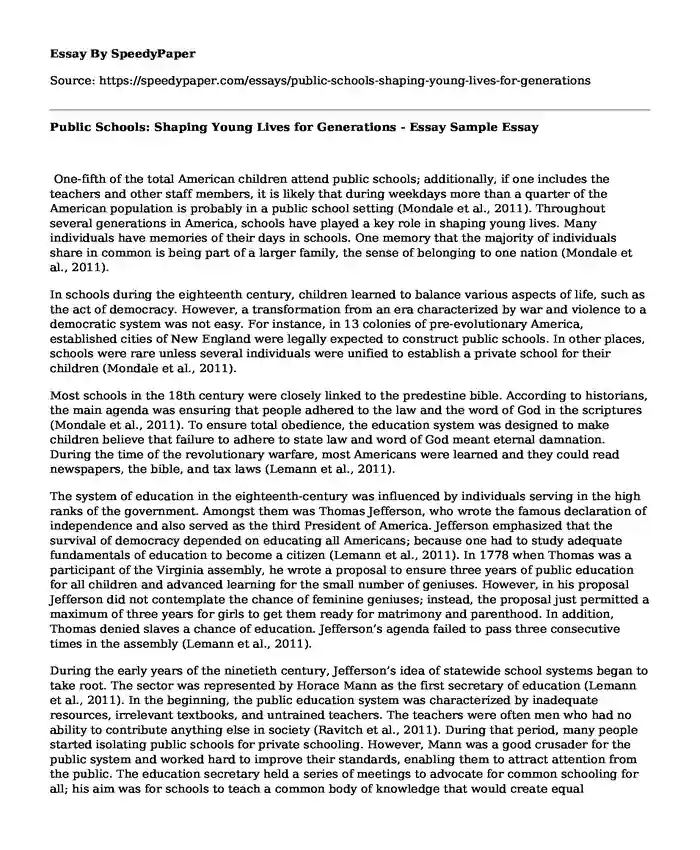One-fifth of the total American children attend public schools; additionally, if one includes the teachers and other staff members, it is likely that during weekdays more than a quarter of the American population is probably in a public school setting (Mondale et al., 2011). Throughout several generations in America, schools have played a key role in shaping young lives. Many individuals have memories of their days in schools. One memory that the majority of individuals share in common is being part of a larger family, the sense of belonging to one nation (Mondale et al., 2011).
In schools during the eighteenth century, children learned to balance various aspects of life, such as the act of democracy. However, a transformation from an era characterized by war and violence to a democratic system was not easy. For instance, in 13 colonies of pre-evolutionary America, established cities of New England were legally expected to construct public schools. In other places, schools were rare unless several individuals were unified to establish a private school for their children (Mondale et al., 2011).
Most schools in the 18th century were closely linked to the predestine bible. According to historians, the main agenda was ensuring that people adhered to the law and the word of God in the scriptures (Mondale et al., 2011). To ensure total obedience, the education system was designed to make children believe that failure to adhere to state law and word of God meant eternal damnation. During the time of the revolutionary warfare, most Americans were learned and they could read newspapers, the bible, and tax laws (Lemann et al., 2011).
The system of education in the eighteenth-century was influenced by individuals serving in the high ranks of the government. Amongst them was Thomas Jefferson, who wrote the famous declaration of independence and also served as the third President of America. Jefferson emphasized that the survival of democracy depended on educating all Americans; because one had to study adequate fundamentals of education to become a citizen (Lemann et al., 2011). In 1778 when Thomas was a participant of the Virginia assembly, he wrote a proposal to ensure three years of public education for all children and advanced learning for the small number of geniuses. However, in his proposal Jefferson did not contemplate the chance of feminine geniuses; instead, the proposal just permitted a maximum of three years for girls to get them ready for matrimony and parenthood. In addition, Thomas denied slaves a chance of education. Jefferson’s agenda failed to pass three consecutive times in the assembly (Lemann et al., 2011).
During the early years of the ninetieth century, Jefferson’s idea of statewide school systems began to take root. The sector was represented by Horace Mann as the first secretary of education (Lemann et al., 2011). In the beginning, the public education system was characterized by inadequate resources, irrelevant textbooks, and untrained teachers. The teachers were often men who had no ability to contribute anything else in society (Ravitch et al., 2011). During that period, many people started isolating public schools for private schooling. However, Mann was a good crusader for the public system and worked hard to improve their standards, enabling them to attract attention from the public. The education secretary held a series of meetings to advocate for common schooling for all; his aim was for schools to teach a common body of knowledge that would create equal opportunities for all students (Ravitch et al., 2011). He regarded the public schools as a common ground for all Americans despite their ethnic group, social class, or gender. Horace advocated free education for all to attract children from all backgrounds with the funding of tax dollars. Unfortunately, his agenda was vigorously opposed.
Even as the agenda of common education was slowly picking up pace, the issue of religion resulted in conflicts across the region. Large numbers of immigrants were arriving from Europe; by 1840, nearly half of New York’s population was comprised of foreign people (Ravitch et al., 2011). The majority of immigrants were Irish Catholics who were generally poor and desperate for basic education. When these individuals found out that education was free in public schools in the area, they attended in large numbers. However, Mann’s agenda advocated for the usage of religious practices that were common for everyone (Ravitch et al., 2011); this meant using the Predistan way of life that was mostly anti-Catholic and anti-Irish. As a result, an Irish immigrant named John Hughes launched a protest against a system of education that was biased against their religious beliefs. The campaign caused many Irish children to abandon school and lived idly in the streets of New York (Ravitch et al., 2011).
References
Lemann, N., Tyack, D., Walker, V., Skylar, K., & Kaestle, C. (2011, October 5). School: The Story of American Public Education (2 of 6). YouTube. https://youtu.be/LinNGjVvXmQ
Mondale, S., Lemann, N., Edwards, M., Anderson, J., & Finn, C. (2011, October 4). School: The Story of American Public Education (1 of 6). YouTube. https://youtu.be/fPc7RnGOho0
Ravitch, D., Lemann, N., & Shaw, R. (2011, October 5). School: The Story of American Public Education (3 of 6). YouTube. https://youtu.be/C5EoQ45nHKU
Cite this page
Public Schools: Shaping Young Lives for Generations - Essay Sample. (2023, Nov 24). Retrieved from https://speedypaper.net/essays/public-schools-shaping-young-lives-for-generations
Request Removal
If you are the original author of this essay and no longer wish to have it published on the SpeedyPaper website, please click below to request its removal:
- Free Essay on Importance of Music Education in Schools
- Compare and Contrast Essay on Fulltime School and Fulltime Job
- How Democratic Was the Jacksonian Democracy? Essay Sample
- Tarasoff Case Analysis: Mental Health Assessments and Legal Considerations - Case Study Example
- Paper Sample on Fixed and Open Learning Mindsets
- Essay Sample on Coronavirus Cases
- Spelling Reforms in English: Necessity, Influences, and Responsible Entities - Report Sample
Popular categories





